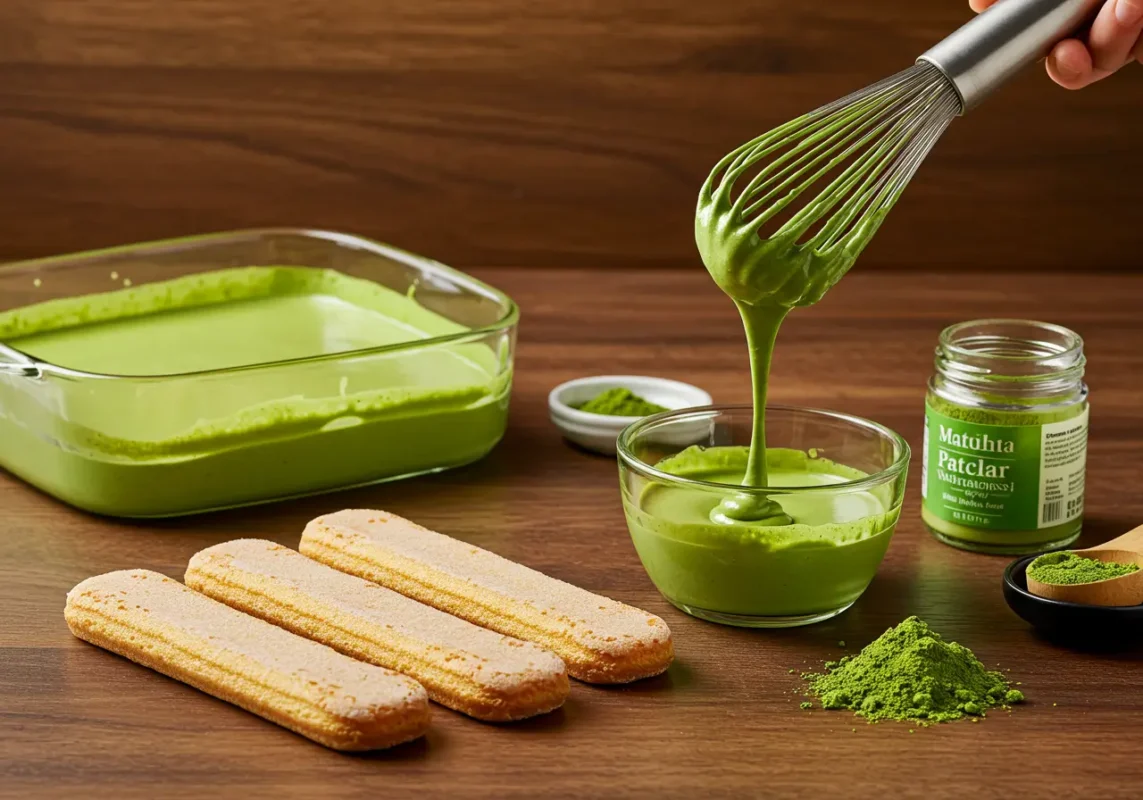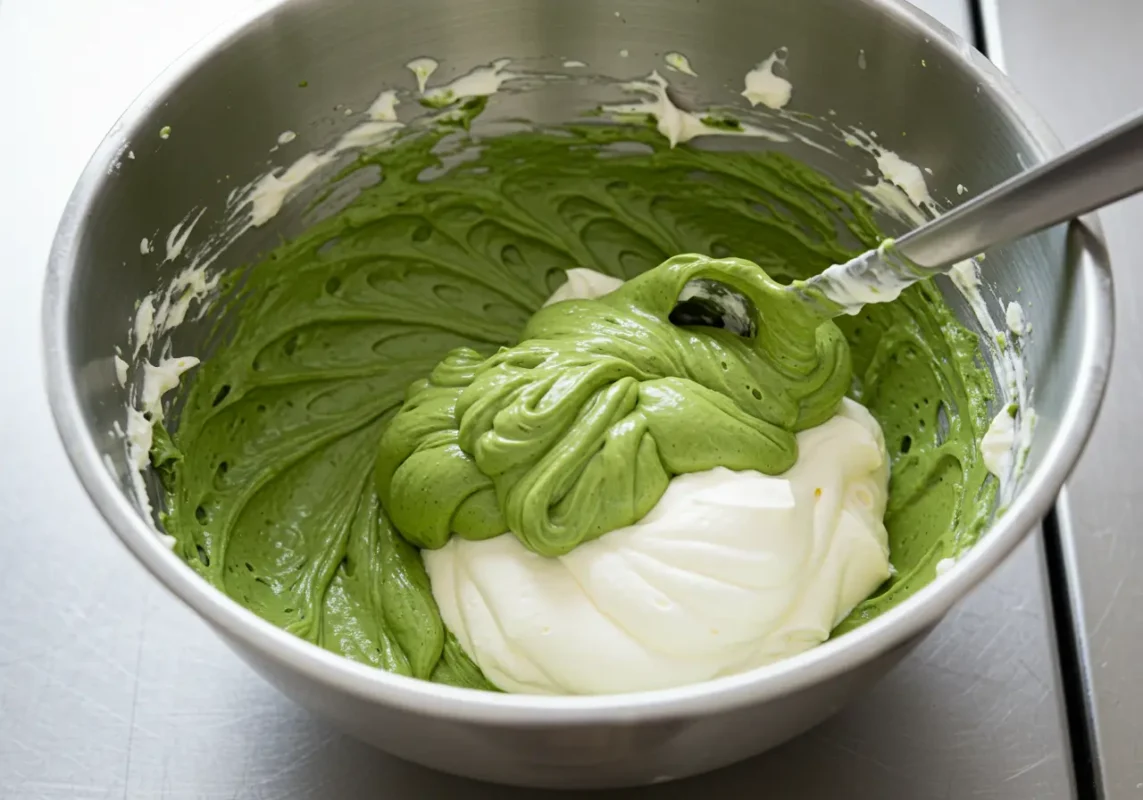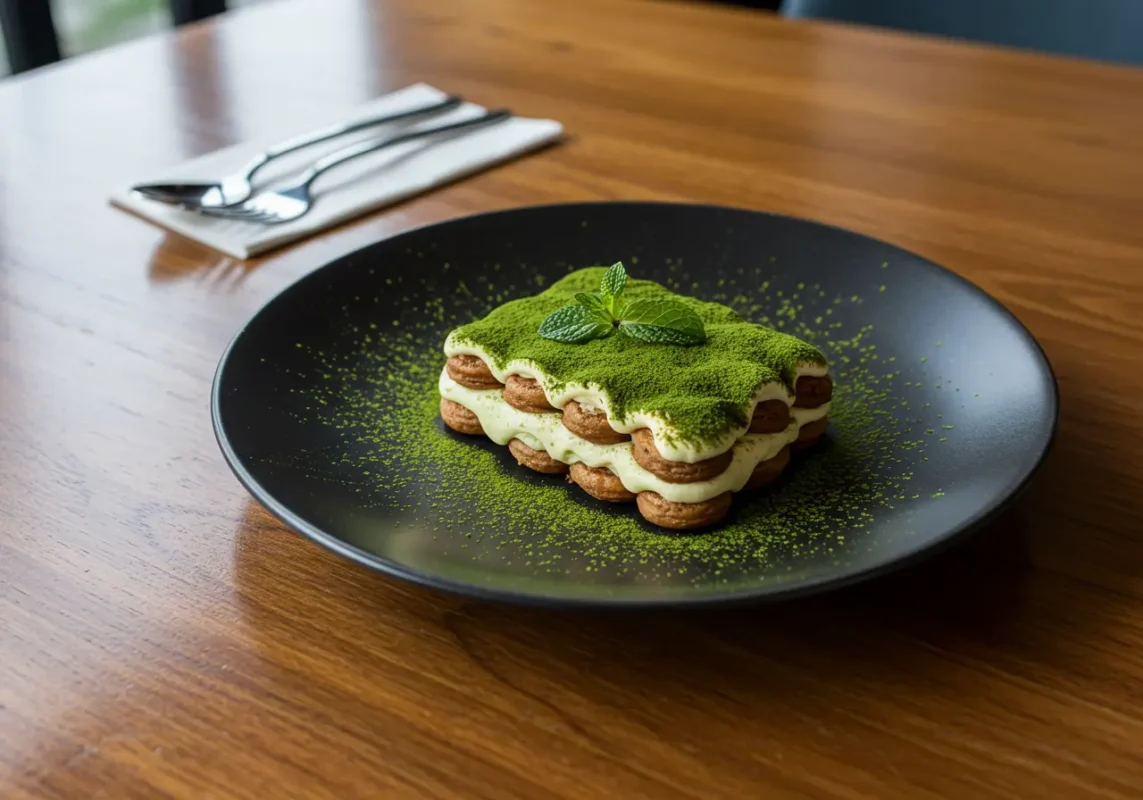The Art of Matcha Tiramisu: A Fusion of Japanese and Italian Culinary Traditions
Before diving into the world of Matcha Tiramisu , it’s essential to understand what makes this dessert both unique and beloved by food enthusiasts everywhere. This article explores the origins, preparation methods, and various adaptations of this delightful fusion of Japanese matcha and Italian tiramisu. We’ll cover everything from the basics of matcha to innovative ways to present your creation. So, grab a cup of matcha tea, sit back, and let’s embark on this sweet journey together.
Origins and Evolution of Matcha Tiramisu
Print
Matcha Tiramisu
- Total Time: 2hours hrs 25minutes mins
- Yield: 11.5 x 4 x 4-inch rectangular cake 1x
Description
This Matcha Tiramisu is a delightful twist on the classic Italian dessert, featuring layers of delicate ladyfingers soaked in matcha tea, creamy mascarpone filling, and a dusting of vibrant green matcha powder. The earthy bitterness of matcha perfectly balances the rich sweetness, making it a sophisticated yet easy-to-make treat. It’s a no-bake dessert that’s perfect for matcha lovers and a stunning addition to any occasion!
Ingredients
Matcha Soaking Mixture:
- 2 tablespoons matcha powder
- 1 cup hot water
- 2 tablespoons honey (or sugar)
Mascarpone Cream:
- 1 cup heavy cream (cold)
- 8 oz (225g) mascarpone cheese
- ¼ cup granulated sugar
- 1 teaspoon vanilla extract
Assembly:
- 20–24 ladyfinger biscuits
- 1 tablespoon matcha powder (for dusting)
Instructions
Prepare the matcha soaking mixture: In a small bowl, whisk matcha powder with hot water until fully dissolved. Stir in honey or sugar. Let it cool to room temperature.
Make the mascarpone cream: In a mixing bowl, beat heavy cream until soft peaks form. In a separate bowl, whisk mascarpone, sugar, and vanilla until smooth. Gently fold the whipped cream into the mascarpone mixture until well combined.
Assemble the tiramisu: Quickly dip each ladyfinger into the matcha mixture (do not oversoak) and layer them in a dish or individual cups. Spread half of the mascarpone cream over the ladyfingers.
Repeat the layers: Add another layer of soaked ladyfingers, followed by the remaining mascarpone cream. Smooth the top with a spatula.
Chill and set: Cover and refrigerate for at least 4 hours (or overnight) for the best flavor and texture.
Finish and serve: Before serving, sift a generous layer of matcha powder over the top. Slice and enjoy!
Notes
- For a stronger matcha flavor, increase the matcha powder in the soaking liquid.
- For a boozy twist, add 1 tablespoon of matcha liqueur or white rum to the soaking mixture.
- To make it vegan, use coconut whipped cream and dairy-free mascarpone substitutes.
- Best enjoyed chilled and within 2 days for the freshest taste!
- Prep Time: 25
- Category: Dessert
- Cuisine: Fusion
Nutrition
- Serving Size: 6-8 servings
- Calories: 569
- Sugar: 24
- Sodium: 110
- Fat: 32
- Saturated Fat: 18
- Unsaturated Fat: 1
- Trans Fat: 0.003
- Carbohydrates: 51
- Fiber: 0.4
- Protein: 14
- Cholesterol: 240
Origins and History of Matcha Tiramisu
The birth of traditional tiramisu dates back centuries, but how did matcha find its way into this classic Italian dessert? Let’s unravel the story behind this captivating blend of flavors.
The Birth of Tiramisu
Tiramisu originated in Italy during the late 20th century, gaining popularity for its simplicity and indulgence. Initially made with ladyfingers dipped in coffee and layered with mascarpone cheese, it quickly became a staple in many households.
How Matcha Transformed Traditional Tiramisu
Fast forward to today, where matcha has taken center stage, transforming the humble tiramisu into a sophisticated treat. By replacing traditional coffee with matcha, chefs have introduced a new dimension of earthy, umami flavors that complement the creamy texture of mascarpone perfectly.
Why Matcha Tiramisu is Gaining Popularity
Matcha isn’t just another trendy ingredient; it offers numerous health benefits and versatile applications in the kitchen.
Health Benefits of Matcha
Rich in antioxidants like catechins and EGCG , matcha provides a host of health benefits, including improved metabolism and reduced inflammation. Incorporating matcha into your diet, especially through desserts like Matcha Tiramisu , can be both enjoyable and beneficial.
Versatility in Dessert Creations
Beyond its health perks, matcha adds a vibrant green hue and distinct flavor to baked goods, making it a favorite among bakers looking to innovate. Its adaptability allows for endless creative possibilities, from adding matcha to frostings to infusing it into ganache.
Perfect Cake Slicing Techniques
Learn how to slice a cake perfectly with expert tips on portioning and presentation.
Understanding Matcha and Its Role in Matcha Tiramisu
What is Matcha?
Matcha is much more than just a trendy ingredient—it’s a cornerstone of Japanese culture and cuisine. To truly appreciate Matcha Tiramisu , it’s crucial to understand what makes matcha so special.
The Production Process of Matcha
Matcha is made from shade-grown tea leaves that are ground into a fine powder. This meticulous process begins with shading the plants weeks before harvest, which increases chlorophyll levels and gives matcha its vibrant green color. After harvesting, the leaves are steamed, dried, and stone-ground into a fine powder.
Different Grades of Matcha
Not all matcha is created equal. The quality varies based on factors like the age of the plant, growing conditions, and processing methods. Premium ceremonial grade matcha, for instance, is reserved for tea ceremonies due to its superior taste and aroma, making it ideal for Matcha Tiramisu.
The Science Behind Matcha’s Flavor Profile
Understanding why matcha enhances Matcha Tiramisu requires delving into its unique chemical composition.
Matcha’s Unique Aroma
Matcha’s aroma is complex, with notes of grass, seaweed, and sometimes even hints of chocolate. These aromas come from compounds like theanine and caffeine , which contribute to its distinctive flavor profile.
How Matcha Enhances Sweetness
Interestingly, matcha doesn’t just add flavor; it also enhances sweetness. The presence of certain amino acids in matcha interacts with sugars, amplifying their sweetness without needing additional sugar. This characteristic makes matcha an excellent partner for desserts like Matcha Tiramisu.
Traditional vs. Modern Matcha Tiramisu Recipes
Classic Italian Tiramisu
Traditional tiramisu is a beloved dessert that combines simple ingredients to create a memorable experience.
Key Ingredients in Traditional Tiramisu
The classic recipe includes savoiardi (ladyfingers), eggs (separated yolks and whites), mascarpone cheese, white sugar, strong coffee, and cocoa powder. Each component plays a vital role in achieving the perfect balance of flavors and textures.
Step-by-Step Preparation
Making traditional tiramisu involves soaking the ladyfingers in coffee, layering them with a mixture of mascarpone, egg yolks, and sugar, and finishing with a dusting of cocoa powder. The result is a moist, creamy dessert that captures the essence of Italian simplicity.
Modern Matcha Tiramisu Variations
With the rise of matcha’s popularity, chefs have been experimenting with innovative ways to incorporate this versatile ingredient into tiramisu.
Gluten-Free and Vegan Options
For those with dietary restrictions, there are now gluten-free and vegan versions of Matcha Tiramisu . Replacing traditional ladyfingers with gluten-free biscuits or almond flour cookies and using coconut cream instead of mascarpone creates a delightful alternative that maintains the integrity of the dish.
Innovative Flavors Combining Matcha with Other Ingredients
Some adventurous cooks have taken Matcha Tiramisu to new heights by combining it with other flavors. Adding a touch of citrus zest, such as lemon or orange, or pairing it with seasonal fruits like berries can elevate the dessert to a gourmet level.
- Calories in Chocolate Cake
Find out how many calories are in a slice of chocolate cake and enjoy guilt-free indulgence.
Step-by-Step Guide to Making Matcha Tiramisu

Preparing the Matcha Syrup
Creating the perfect matcha syrup is the first step toward crafting a delicious Matcha Tiramisu . Follow these steps to ensure your syrup is both flavorful and smooth.
Selecting High-Quality Matcha Powder
Choosing the right matcha powder is crucial. Look for premium ceremonial-grade matcha, which offers the best flavor and color. Ensure the powder is finely ground and free from lumps for a silky consistency.
Techniques for Brewing Matcha
To prepare the matcha syrup, start by whisking 1.5 teaspoons of matcha powder with 2 tablespoons of sugar until you get a smooth paste. Gradually add 1/4 cup of hot water, whisking continuously to avoid clumping. Once smooth, stir in 1/4 cup of brewed espresso or strong coffee for an extra kick 4. Let the mixture cool slightly before using.
Creating the Mascarpone Filling
The mascarpone filling is the heart of your Matcha Tiramisu . It should be light, creamy, and full of flavor.
Tips for Whipping Cream Perfectly

Whipping cream can be tricky, but with a few tips, you’ll achieve the perfect texture. Chill your bowl and beaters in the refrigerator for at least 10 minutes before whipping. Add 1/2 cup of sugar gradually as you whip the cream to stiff peaks. This ensures a stable and fluffy consistency.
Incorporating Matcha into the Mascarpone Mixture
Once your whipped cream is ready, gently fold it into 250 grams of softened mascarpone cheese along with 1 tablespoon of vanilla extract. Stir in the cooled matcha syrup, ensuring the mixture is evenly combined. This will give your filling its signature green color and robust flavor.
Serving Suggestions and Presentation Ideas
Pairing Matcha Tiramisu with Beverages
Enhance the enjoyment of your Matcha Tiramisu by pairing it with complementary beverages that highlight its unique flavors.
Complementary Tea Choices
A cup of green tea, particularly sencha or genmaicha, pairs wonderfully with Matcha Tiramisu . The subtle bitterness of these teas complements the sweetness and earthiness of the dessert. Alternatively, try a jasmine green tea for a floral twist.
Wine Pairings
For those who prefer wine, consider a light-bodied white wine like Pinot Grigio or a crisp sparkling wine. These wines offer a refreshing contrast to the richness of the tiramisu, enhancing the overall dining experience 5.
Creative Ways to Present Matcha Tiramisu
Presentation can make all the difference when serving Matcha Tiramisu . Here are some ideas to elevate your dessert game.
Plating Techniques
Serve individual portions in glass bowls or ramekins for a sophisticated look. Arrange the layers neatly, ensuring each bite contains a bit of everything. Garnish with a sprinkle of matcha powder or fresh berries for added visual appeal.
Garnishing Ideas
For an extra touch, drizzle a thin line of dark chocolate sauce around the rim of your serving dish. This not only looks beautiful but also adds a delightful contrast in flavor and texture. You could also top the dessert with a dollop of whipped cream and a single edible flower for a whimsical finish.
- Cake Without Cream Recipes
Try these delicious cake recipes without cream for lighter, allergy-friendly desserts.
Troubleshooting Common Issues When Making Matcha Tiramisu
Common Problems and Solutions
Even experienced bakers can encounter challenges when preparing Matcha Tiramisu . Here’s a breakdown of some common issues and how to fix them.
Issues with Texture
One of the most frequent complaints is that the dessert turns out too soggy or too dry. To avoid this, ensure your ladyfingers are thoroughly soaked but not overly saturated. A quick dip in the matcha syrup should suffice, allowing them to absorb just enough moisture without becoming mushy.
Flavor Discrepancies
Sometimes, the matcha flavor might seem too weak or overwhelming. Adjusting the amount of matcha powder can help balance the taste. Start with 1.5 teaspoons and adjust according to your preference. Additionally, using high-quality matcha ensures a richer, more authentic flavor.
Tips for Achieving Perfection
Getting the perfect Matcha Tiramisu takes practice, but these tips can help streamline the process.
Temperature Control
Temperature plays a critical role in ensuring the dessert sets correctly. Allow the matcha syrup to cool slightly before incorporating it into the mascarpone mixture. This prevents curdling and ensures a smooth consistency. Similarly, refrigerate the assembled tiramisu for several hours to allow flavors to meld and textures to set properly.
Ingredient Proportions
Accurate measurements are key to achieving the right balance of flavors and textures. Double-check your ingredient amounts, especially when adjusting for dietary preferences like gluten-free or vegan options. Precision in these details can make all the difference in your final product.
- Single-Serve Chocolate Cake Slice
Indulge in a decadent chocolate cake slice that’s perfect for satisfying your sweet tooth.
Matcha Tiramisu Around the World

Regional Adaptations of Matcha Tiramisu
The global appeal of Matcha Tiramisu has led to various regional adaptations, each adding its unique twist to the classic recipe.
European Influences
In Europe, chefs often incorporate local ingredients and techniques to create variations of Matcha Tiramisu . For example, some might replace ladyfingers with sponge cake or add a layer of fruit compote for extra flavor complexity. Others may experiment with different types of alcohol, such as amaretto or rum, to enhance the dessert’s depth.
Asian Interpretations
Asian chefs bring their own flair to Matcha Tiramisu , often integrating traditional flavors and ingredients. In Japan, matcha is a staple, and it’s common to see Matcha Tiramisu served with a side of green tea ice cream or topped with mochi balls for a playful touch. These additions not only enhance the dessert’s visual appeal but also offer new sensory experiences.
- Why Choose Petite Size Cakes?
Discover why petite size cakes are ideal for family gatherings—small in size, big on flavor!
Cultural Significance of Matcha Tiramisu
Beyond its culinary merits, Matcha Tiramisu holds cultural significance in both Japan and Italy, reflecting the blending of two rich culinary traditions.
Symbolism in Festivals
During festivals and celebrations, Matcha Tiramisu is often featured as a centerpiece, symbolizing harmony and unity between cultures. Its vibrant green color and layered design make it an ideal choice for special occasions, where it can be enjoyed by people of all ages.
Social Impact
The popularity of Matcha Tiramisu extends beyond the kitchen, influencing social gatherings and events. It has become a symbol of innovation and creativity, encouraging people to explore new flavors and combinations. Whether enjoyed at home or shared with friends, Matcha Tiramisu continues to bring joy and connection to communities worldwide.
FAQs About Matcha Tiramisu
Can You Make Matcha Tiramisu Without Eggs?
Absolutely! Many recipes, like the one from Just One Cookbook, offer alternatives to traditional eggs. Using egg yolks adds richness and creaminess, but you can easily substitute them with heavy cream or even aquafaba for a vegan option. This flexibility makes Matcha Tiramisu accessible to those with dietary restrictions.
Is Matcha Tiramisu Suitable for Diabetics?
While Matcha Tiramisu is typically sweet, there are ways to make it diabetic-friendly. Opt for low-sugar or sugar-free ingredients, such as using stevia or monk fruit sweetener instead of granulated sugar. Additionally, reducing the portion size and pairing it with a balanced meal can help manage blood sugar levels.
Where to Buy High-Quality Matcha Powder
Finding high-quality matcha can be challenging, but several reputable brands offer exceptional products. Look for organic, ceremonial-grade matcha from trusted sources like Ippodo Tea Co. or Encha. These brands prioritize sustainability and produce matcha with superior flavor and color.
Best Time to Serve Matcha Tiramisu
Matcha Tiramisu is best served chilled, ideally after being refrigerated for several hours. This allows the flavors to meld and the textures to set perfectly. It pairs wonderfully with afternoon tea or as a decadent dessert after dinner. For optimal freshness, consume within three days of preparation.
Conclusion: Embrace the Richness of Matcha Tiramisu
From its vibrant green hue to its unique blend of flavors, Matcha Tiramisu is a dessert that continues to captivate and delight. Whether you’re a seasoned baker or just starting out, there’s always room for creativity and experimentation. Embrace the richness of this versatile dessert and enjoy the satisfaction of crafting something truly special. Cheers to more memorable moments with every bite!
- Small Chocolate Cake Recipe
Bake a rich and moist small chocolate cake that’s perfect for intimate celebrations.
- What’s the Smallest Cake Called?
Explore what the smallest cake is called and why these tiny treats are so popular.
- Adjust Baking Time for Smaller Cakes
Learn how to adjust baking times for smaller cakes to achieve the perfect texture every time.






